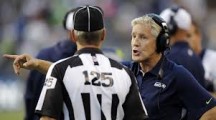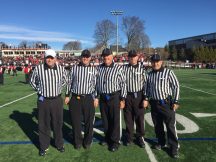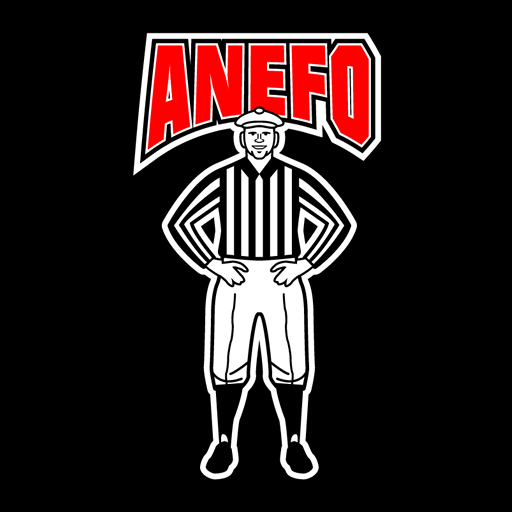- Signals should be deliberate and sharp. All officials should pick up time out signals, especially the umpire because of his position on the field, namely, in the middle.

- Special care should be given to ball spotting on “previous spot plays”. Don’t give yardage or take it away.
- Referees — Be consistent in making the ball ready for play
- Be aware of a potential 1st down measurement. Don’t move the ball too quickly.
- Count offensive and defensive players on every down.
- Be especially alert during a “hurry-up offense”.
- A time out signal should be given if there is doubt about the recovery of a fumble. Team direction can follow when officials are positive which team has the ball.
- There are no “4, 6, 9, 11, 14, or 16 yard penalities in the rule book (Check yardage marked off on all penalities.)
- Be alert to a “pick off” on forward pass plays. (contact is necessary)
- Watch for hooking or holding by the defense against potential pass receivers.
- Officials should never grasp or hold on the facemask of any player when preventing or breaking up a fight.
- No disqualification unless absolutely necessary. Be sure to see the whole action. Check with your colleagues to verify what was seen.
- Questions of judgment on the part of any official are not open to argument on the field, during halftime, or after the game.
- Do not become overly friendly with players, coaches, or athletic directions.
- Coaches are not permitted on the playing field during the game without permission. Coaches are not to visit with officials in their dressing room.
- Do not blow your whistle in anticipation of a foul.
- Pick up your flag if you realize the foul wasn’t there.
- Don’t try to “bulldoze” a phantom foul if you know you were wrong.
- Remember the four “W’s” in reporting fouls: who, what, where, when.
- Be discreet is speaking to the referee if you believe the wrong yardage was measured off, but speak to him.
- Officials not involved specifically on a play that is ruled dead should be aware of continuing action fouls. (Clean up the play.
- If the number of a down is in doubt, call an officials’ time out and consult. Get it right.
- Be sure to stop the clock following every 4th down play.
- Help each other on possible 1st down measurements
- Be watchful for piling on, chop blocks, and tripping.
- All officials should review, in their own minds, basic spots of enforcement as a check of the referee’s enforcement of a penalty. If he is wrong, speak to him immediately
- Review legal and illegal blocks. Be alert for illegal blocking during kick plays.
- All officials should be in their designated area at the snap.
- Officials should be alert for pass and/or run on all plays.
- On loose balls near a sideline, be aware of who last had possession in case the ball goes out of bounds.
- Review crowd noise procedures that might delay the game.
- Don’t “yell” at a player because he is “yelling”
- Be aware of the mandatory equipment and uniform code as listed in the rule book.
- Know the team captains by number. If you are the referee, it’s not a bad idea to know them by name also.
- Know the tie-breaker procedures for each league you are working in.
- Remember that players get excited and emotional. You must be poised and calm.
- The members of the chain crew are technically minor officials. Do not allow them to “cheerlead” or become vocally involved in the game.
- The dressing room is out of bounds to everyone except the crew and commissioner.
- Stay in shape and watch your weight.
- Communicate with head coach. Don’t be aloof.
- Don’t blow your whistle unless you see the ball.
- Wing-Men – Officiate your side of the ball before or at the snap.
- Discourage comments and talk between players
- Keep officiating after calling a foul.
- Wear glasses or contacts if you need them, but not sunglasses.
- Keep officiating after the ball becomes dead.
- Do not discuss controversial calls with anyone after a game except crew members and the commissioner.
- Give yourself extra time to get to a varsity assignment.
- A majority opinion prevails in a crew conference. The referee has only one vote. However, he breaks all ties.
- Appearance counts, look and act like an official.!!!

